Maybe you’re interested to know how Pyruvate Kinase Deficiency affects other people? How do they cope? Do they need transfusions? How different is their life from a healthy person? Since the severity of the disease can be very different depending on the person, we gathered some personal testimonials for you to read. If you’re interested in sharing your story, please visit this page.
Here are all the stories we assembled. You can either scroll down to read every story, or you can click on one of the summaries:
- A mother of a two year old girl from The Netherlands, talks about the rollercoaster of emotions when having a newborn child with PKD and searching for a diagnose.
- This young woman from Sweden has learned to always try and find the most efficient or fast way to handle things. She tells about her life and her struggles with PKD and gallstone pain attacks.
- This 40-year-old woman from the Netherlands, lived life to the fullest when she was young, but after having her children, she learned to listen to her body and respect her own limits.
- This 20-year-old girl from the USA, was diagnosed with PKD when she was 10 years old. At age of 15, she had a splenectomy. She now wants to become a nurse.
- Having a different, yellow skin color can cause major problems when being a teenager. This 50-year-old man from England shares his experiences and deepest feelings in retrospect.
- When you are a new mum there is allot that will happen in the first few days and months. A Mother of a newborn baby just being diagnosed with PKD tells about the first few month of their daughters life.
- PKD can have different forms of severity. For exemple, this young woman from Belgium isn’t transfusion dependent and has a normal and active life despite having PKD.
Mother of a two year old girl, The Netherlands
As new parents, there is no way you can know what you are doing. You just get too little sleep and dressing your little kid takes half an hour, because those little arms and legs just don’t help you at all. But in our case we had another thing to worry about. Our daughter Tess was very little, didn’t grow well and we were at the consultation bureau a lot. Thankfully she was also a very pretty, alert little girl and although she was very pale, we had no idea what was going on with her. We just trusted the opinion of the doctors surrounding us.
When Tess was 8 weeks old, the doctors found out that her hemoglobin was only 2.1 mmol/l (3,36 g/dl). Our lives changed completely at that time and we realized that we could have losed her if it had taken a little longer.
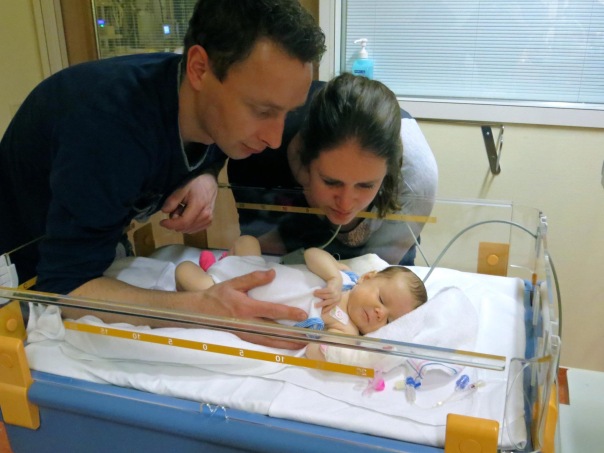
We found ourselves sitting in a rollercoaster of emotions. We needed to go to the hospital every 2 weeks for blood testing and a schedule of bloodtransfusions followed. Like a miracle, Tess wasn’t bothered by any of this and was always happy to go to the hospital, as if she knew that it was good for her.
Although it all happened so fast, we still didn’t know what was wrong with Tess and after 9 months, the local hospital referred us to the academic children hospital in Utrecht. There they took our DNA and finally, 3 days before her first birthday, they found out that Tess had a rare genetic disease called ‘pyruvate kinase deficiency’ and that we were both carrier of this disease. We were relieved to know what she had, but we were sad that there was not a lot they could do about it.
The childrens hematologist suggested after a few months to do a stem cell transplantation, which of course is a very risky procedure. So, before making this decision we consulted another haematologist for a second opinion. He advised us to do a spleenremoval surgery, which we then discussed with our own haematologist. He understood our doubts and agreed with the advice.
Before we could really decide for this surgery we came in contact with a biochemist who described some food additives which could stabilize her Hb. We gave her this, but until now we haven’t seen any result unfortunately.
So, at the 3rd of February 2015 we have our first meeting with the surgeon who will do the spleen revomal surgery. We still find this decision very difficult because no one can give us any guarantees that this will do her good, but going on like this isn’t an option as well, so we feel we have no other choice.
Tess is a very happy girl, who crawled around when she was 6 months, stood when she was 8 months, walked around the table when she was 9 months and walked through the room at 13 months. The only trouble that she is having since she was born, is sleeping. She is having trouble going to sleep and she wakes up in the night, which results in her coming to bed with us eventually because than she will sleep. She is also not a big eater so especially dinner is a struggle most of the time.
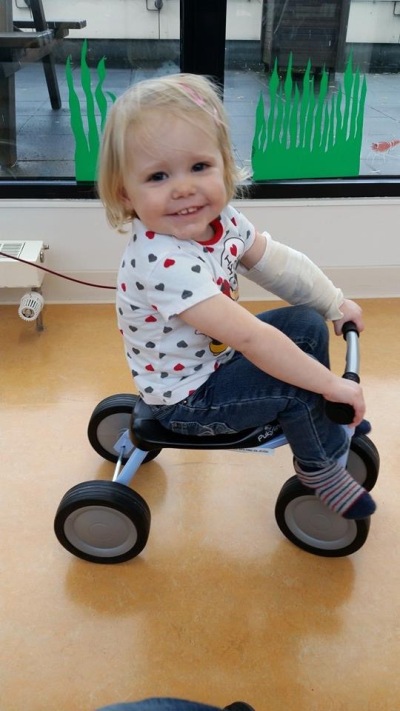
My ground school teacher once said to my parents “Your daughter is always trying to find the most efficient or fast way to handle things”. I often think about that and I must say she was quite right about it. When I grew up I think that behavior worked like an energy saver for me. I knew I didn’t have a lot of energy, therefore I needed to be efficient and get things done before I got tired.
I was two years old (born 1985) when the doctors found out I had Pyruvate Kinase Deficiency. Before that, my parents feared for leukemia as I was anemic. I couldn’t keep my blood levels up but at first they thought it would pass. They took every test they could think of and every time my parents feared for the test results. When I finally was diagnosed it was kind of a relief as my diagnose was not deadly but my parents had never heard of Pyruvate Kinase Deficiency. The doctors didn´t know so much about this disease either, but I managed fine. At two and a half years of age I got my last blood transfusion (as a child) and it would take several years before I ever needed one again.
I have always had lots of troubles with pains from gallstones as a child and there has been several visits to the emergency room because of gallstone pain attacks. The doctors believed it was the appendix but never operated as the pains went away after a few hours. It was not until I was about 25 that I got to know about the connection between pkd and gallstones.
Apart from that I was fortunate not to have so many problems due to Pyruvate Kinase Deficiency as a child. I was pale, quite calm and tired from time to time but I played soccer and ran around outside with my friends. As I had no further medical issues that we thought was connected to pkd, my yearly doctor’s appointments stopped when my pediatrician retired. Today I wish that I had been sent to a doctor of hematology at this point. Even if the Pyruvate Kinase Deficiency wasn´t causing me any trouble it would have been a good thing to check up my hb now and then. I never felt different as a child. In fact I thought everyone of my classmates had their own doctor and went to the hospital at least once a year, just like me.
When I was 18, I graduated and moved away from home to continue my studies. During that year my medical state became a real problem. I got very tired for no reason. The food at school was not enough to get me the energy I needed to concentrate on my studies. As I was so tired I ate a lot of sweets that raised my blood sugar and at least gave me some more energy. Even though I took long walks every day I started gaining weight. Not realizing my health issues could have something to do with the blood levels, I continued to study, trying my best to concentrate and keep up the energy. When my mum visited, she saw how weak I was and that I barely had the energy to walk up a stair. She took me to the doctors. The blood level of Hb was about 6.0 g/dl. No wonder I couldn´t concentrate in class and that my body craved sweets to get any kind of energy kick. Since then I have had regular blood transfusions with about one or two months of intervals. I also got a new doctor who was specialized in hematology.
My problems with pain from gallstones kept coming back. The pain was so hard that I started fainting during attacks which actually was a relief as it made the pain go away. Finally my gallbladder was removed and it made my life so much easier not having to be worried about getting attacks. I have not had problems with digesting, which I have heard you can get from removing the gallbladder.
Today I live a fairly normal life. I travel a lot, I have a fulltime job and I enjoy a lot of activities. I get transfusions about every other month and I have just started taking Exjade to lower my iron levels. For a period I ran a lot, maybe three to four times a week and I noticed I had to have transfusions more often but I don´t know if it was actually due to the running or if my body just was weaker during this period. Today I try to vary my exercise.
Another thing I have to think about is that I easily get infections like colds especially when my body is weak after not getting enough sleep. After the infection my body often screams for blood.
I feel that I accept my condition and that I do my best to live a good life. As I have searched for information about Pyruvate Kinase Deficiency, I have realized pkd can affect people in so different ways, so just try to find out how your body response to the things you want to do in life and do the best you can to live a good life.
Woman, 40 years old, Netherlands
I was born in 1974 in a little town in the Netherlands. I wasn’t the first in the family with this disorder, my sister was born with Pyruvate Kinase Deficiency two years earlier. So when I was born my parents and the doctors knew why I looked like a beautiful yellow baby girl. I had pitch black hair and my taint was almost brown. I looked beautiful, but not quite normal. So within minutes I was put into quarantine and I had an exchange transfusion in my head. My birth was a very traumatic event for my parents, because the doctors in this village were very old-fashioned and most of all they were scared of this special disorder. I was in quarantine for 4 weeks and the only people who had permission to pick me up were the nurses. My parents were only allowed to watch through a glass window.
After four weeks the doctors sent me home, with instructions to leave me in my crib and I was only allowed to be picked up by my parents when they were wearing protective clothes. My brother and sister were not allowed near my crib. My father couldn’t do this and because they had experience with my older sister he soon threw the protective clothes away and took me downstairs. From that day forward they tried to treat me like a normal little girl as much as they could.
![CAM02694-1[1]](https://pyruvatekinasedeficiency.com/wp-content/uploads/2015/01/cam02694-11.jpg?w=350&h=523)
In my first two years I had a transfusion every 6 weeks and for this transfusion I had to stay in the hospital for two weeks. The hospital didn’t yet change, they were very protective towards me and so when I lay in the hospital I had to be in my bed and no one was allowed to pick me up, only the nurses.
When I was two years old, my spleen was taken out. I was a tough cookie and wasn’t really bothered by this surgery. 12 hours after my spleen was taken out I was jumping in my bed with a crooked hat on my head. The surgery was successful, I only needed transfusions when I got sick. So that was around 4 times a year.
My youth wasn’t a simple one. Outside the hospital I was bullied a lot because off the color of my skin and because I couldn’t run and play like the other kids. But when I was inside the hospital the same kids came at my bedside feeling sorry for me. I grew up with a lot of fear for people and although I didn’t really like the hospital, it felt very safe for me. Nowadays children like me would go into therapy, but in those days me (and my parents) really had to do it ourselves.
After primary school I went to secondary school. For this I had to cycle 20 km every day and I surprised everyone by doing just that. I cried a lot on the ways and many times I had given so much energy that I almost fainted but I did it because I wanted to fit in. In the process of asking so much of my body I had more friends than ever and although it still wasn’t easy, friendship made my confidence grow.
When I was 16 years old, I got more yellow than I had ever been and I had a lot of stomach pains. After a lot of tests they found out that I had gallstones. They were taken out in the same year of my final exams. Thankfully, this surgery was also successful and I could do my exams after all.
After my final exams I went to a school to be a doctors assistant. My study was far away and so I had to go by train, every day. That went pretty good and I wasn’t in the hospital that often. My energy level was reasonable and I could do quite a lot.
When I finished to be a doctors assistant I felt I wasn’t ready to work. I needed to develop more and I choose to do a social study and I went to a city where I lived on my own, with some friends. My study time was great. I needed to discover myself without the hospitals and without the feeling that I was different. Of course that was impossible, but I needed to live my life to the fullest. I went out till late, drank alcohol, smoked and had a great time. I was sick quite a lot and knew the inside of the hospital well, but I needed to really feel everything to the max. I worked as a volunteer with disabled children and elderly people in my free hours, I learned a lot and partied a lot.
In the first year of my study, it went totally wrong very quickly. The night before, I felt a little sick, just a cold. So I figured that if I went to bed early and rest, everything would be alright. The next day, I felt weird and my roommate called a doctor for me, or maybe I did it myself, I can’t remember. I went back to bed and waited for the doctor to come. When he came, I opened the door for him and he was shocked by my looks. He called an ambulance and I went out to write a letter to my roommates. Later on I read the note and it was complete nonsense what I wrote, so my roommates were also shocked. I went back to bed and vaguely remember that the ambulance came and that they carried me down in a chair. Then everything went black for a couple of hours. My Hb had dropped down to 2.56 g/dl and I was in great danger. It took the doctors quite a while to bring me back.
This situation scared me and some people said that it was my own fault because I didn’t take care of myself well enough. I really felt that it wasn’t true. I knew I lived full speed, but I felt that this crisis just came because of a virus that I couldn’t have avoided, even if I wanted.
So I carried on with my life and thought I could do anything. I went to live in Belgium for my last year and worked on a school for little autistic children. In my free time the party went on and I enjoyed my life. I found my ex-partner that year and I still felt that I could move mountains.
I went back to the Netherlands and started my work carrier and I noticed that this was a whole new ball game. A work situation is very different from school and soon I felt overwhelmed. I worked 32 hours and I could do that, but I felt that if I wanted a family, I needed to make a choice. And so after a couple of years, I decided I needed to cut down on my hours. I now see I made a wrong choice there. I completely followed my heart by my work choice and although that’s good, it wasn’t real. I choose a work that was very challenging and took a lot of my energy. So when I got pregnant my work was too much. I cut back on my hours again to do the same kind of work but in a different setting. But even that was too much and so I ended up doing administrative work, which I really didn’t like, but it was the best I could do at that time.
My second child was born and I thought I could handle it, and I could for a while. But in 2007 I was involved in car crash. Not my fault, but my body reacted to it big time. My body was extremely painful and was not able to fix itself. My energy was completely gone and I felt like I had lived on my spare energy for a long time. I tried to fix myself by resting a lot. I couldn’t do anything else because of the pain, but I needed to be okay again. I tried to do as much as I could and after a year, I started to work again. I loved it and wanted to do everything again, but I felt that my body protested again and I just couldn’t give my energy to my work and to my family at the same time.
In 2011, I went sick and this time I couldn’t go back to work. I had to become a stay at home mom and in the beginning I hated it. Don’t get me wrong, I love my kids, but the idea to have to quit working when I wasn’t even 40 years of age felt like failure to me. I couldn’t build myself up again and just felt like hiding away. That took allot from my marriage and unfortunately My ex-partner and I choose to go our separate ways.
Now I’m 43 and my life is going fine. I met a Lovely man who makes me very happy. I’m used to the idea that I’m not going back to work and I try to look for new things to do. My boys are growing fast and my role as a mother will be smaller and smaller.
Since a few years I get more regular transfusions and my Hb is higher than before (6 mmol/l). That helps me allot. I have more energy, am more positive in my mind and I can feel my muscles are not as painful as they where before. Where they first diagnosed me with Fybromyalgia, I know think my body was just struggling all these years to keep up.
Pyruvate Kinase Deficiency will never stop, but I will try to find myself and live a life as full as possible.
I was born in 1994. My mother’s pregnancy with me went fine. It´s when I was born, when someone realized something was wrong. I was born with no color. My dad says I was grey. Doctors say I had barely any blood running through my body, so the moment I was pushed out I was rushed out to get a transfusion. I got 1 blood transfusion. I was in the hospital for about 2 weeks and then I was able to go home. My mom didn’t really worry about what went on. No one had any idea what was wrong with me so I just went on being a kid. No signs really showed.
When I turned about 10, I started to notice my eyes turning yellow. I was told it was just jaundice and I found out I was anemic. Being anemic, I expected to be tired and weak. Still as I went on with life as a normal teenager. One night, I was sleeping and I felt a horrible pain in my side. I was 15 at this time and figured it was cramps. But the pain got worse. My mom rushed me to the hospital and turned out to be an ovarian cyst. But, the doctor who was working with me wasn’t to worried about my cyst but the coloring of my eyes. He said its more than just me being anemic. He ran some test and my Hb was extremely low. if I´m not mistaken it was a 6 g/dl. He did some research and that’s how I found out I had Pyruvate Kinase Deficiency. I met up with a blood specialist and went over everything that I was going to go through. I got my 2 blood transfusion and it made me feel extremely better. I felt normal well, normal from feeling tired my whole life.
They did some scans and seen where my spleen was extremely large. At 15 my thoughts were just racing. I didn’t want to go through surgery. I didn’t want this disorder. I was extremely angry. December 2009 I got my first surgery. It went well. The surgeon put 3 little holes in me and a little slice in my belly button. The first thing my Dr. told me was I´m one lucky girl. If it wasn’t for the ovarian cyst, my spleen would have burst within the next year and I could have died. He put me on antibiotic’s for the next 5-7 years. I was healed 2 weeks later. After the surgery the first thing I noticed was the yellow in my eyes went away. My Hb went up to a 10. I was relived.
Well, about a year later I was looking into joining the Military. When I was told I couldn’t because I have a blood disorder and I don’t have a spleen, my dreams felt like they were just stolen from me. I was angry, I blamed my parents for giving me this. I hated it. I was extremely depressed for the longest time because it stopped me from doing what I wanted to do.
By 18, I noticed I was starting to feel how I did before I found out I had Pyruvate Kinase Deficiency. The doctors were confused because they said I shouldn’t feel like this. I should feel better. They decided to see if my spleen had grew back. It was the worse day that day, They couldn’t get the shot in my veins it took 3 doctors and 15 shots later before the medicine was put in me. They did the scan and saw where I had another spleen. 3 years later and my spleen had grew back. So I got ready for yet another surgery. March 2013 I went in yet another time to have my spleen removed. This surgery wasn’t too bad. It didn’t hurt like my first surgery. As I layed in the bed I just thought about my life. How much stuff I’ve been through and as I looked around I saw that it could be worse.
That’s when I realized what I wanted to do. My goal now is to be a nurse. I see what these wonderful people do for me, and for me to say ‘Thank you’ isn’t enough. I want to do what they do. It’s been a year since my last surgery and I feel amazing. I’m about to graduate high school and go to college. I dance a lot and walk to maintain my exercise. I am just happy to be alive. I’m still going to go to school to be a nurse. I’m still on antibiotic’s and I still have to watch out for any flus or colds. Getting sick comes a normal thing. I’m not letting it stop me though. I’m now at peace with having Pkd. My doctor has been a Dr. for 20 years and I’m the 2nd person he’s met with Pyruvate Kinase Deficiency. Overall I’m just happy to be living this life.
When I was young I was transfused regularly so I was a pink chubby little boy. After having my spleen removed I gradually turned a bit yellow because I stopped transfusions. But seven years old children are curious, strait forward but not judgemental. By the time I was 11, I was getting really quite yellow, I was also starting a new school with older children. I was quite well but I started to be bullied, I was called yellow boy, alien, ugly. I was excluded from conversations, pushed about and openly laughed at. My feeling of separation from those around me had begun. But I had two good friends at school, one was very short and the other had very thick glasses. We were the outcasts and we knew it. They weren’t bullied much, but I had a terrible time, it was if they were trying to brake me. It’s strange, writing this I can feel my operation scar. The staring and bullying was relentless, all day everyday. I was physically attacked and once I was held against the wall by a group of boys while one boy stuck pins in me. I was determined not to show fear, not to give in. If I felt frightened they would have won and that wasn’t going to happen.
The real problem I had was with girls. They were not anything like as nasty as the boys but they giggled when they saw me and whispered to each other. When I was about 14 there was a girl I liked, somehow I ended up walking her home. She turned to me and said “I really like you but I can’t go out with you, not because of how you look but because of what my friends will say”. That destroyed me, I can’t tell you how deeply that hurt me. Recanting it here brings me back to the place it happened, and the raw pain I felt. The feeling of shame. She was nice and had no idea of the harm she did. Around that time on Valentine’s Day there was a card on my desk, I approached it with a mixture of excitement and disbelief. I felt I was being watched be the other children in the class, it had an over the top loving message inside with lots of kisses, as I read it the other children burst out laughing. When I get out of here it will be okay I thought, maybe when I’m older someone will love me for who I am and not mind what I look like. But in the street more people were staring, I was getting far more yellow. I could see it in the mirror. I was on a bus when the conductor told me I was yellow, as if I didn’t know. I told him why I was yellow and it was okay because I was having treatment. He didn’t believe me and threatened to stop the bus and get help. While everyone listened and stared I persuaded him not to do that. Eventually we moved on
I started my own business at 16. I was an antique dealer and among them I was accepted. People stared and asked me what was wrong, I had a stall outside. I was myself and had created something but I was desperately lonely. I went to art school to study conservation of prints and drawings… There would be girls there ! There were, they were lovely, good friends but a bit older. They talked about their boyfriends to me, I could see they did not see me as a man but as a boy because that is what I was.
But I did meet someone there and we went out for a few months. It was wonderful, I didn’t feel as ugly or dirty as I had. But when people stared and whispered, slightly pointing at me it still hurt. Since I was 16, I was extremely yellow but my 20s it got worse. People were starting to move from their seat if I sat next to them. For years I had walked looking down at the floor to avoid eye contact. This was never going to improve and I started having feeling, strong hateful feelings towards myself. Sometimes I would scrub my face until it hurt because I felt so dirty. There is no point living like this, it’s best not to be alive. But things changed.
I got married aged 30. I was very happy and my self loathing had gone but I got very upset going out. My health was deteriorating and I was even more yellow. Then I had blood exchanges, that helped me to look more normal but I couldn’t cope physically. So then I started blood transfusion and within weeks my yellowness went. I walked down the road smiling at everyone, I felt like I was George Clooney !
I didn’t have transfusions to stop me being yellow but if I could have, I’d have done it when I started to be stared at. I’m fine now but I will never completely get over it.
Mother of a newborn baby just being diagnosed
Our little girl , was born this year in extreme stress as several hours after the birth she was fluorescent yellow! They took her to the NICU only to discover more problems… on top of record levels of jaundice, she was hemolizing very fast and her retic was 44%. This all sounded like Japanese to us… Horror movie in Japanese.!
We were devastated but our little one was completely asymptomatic. They exchanged transfused her in the NICU and she stayed there a week. A week of hell and fear for us but also a week of growth, of finding strength, and of expansion to match the strength our daughter had.
5 weeks after we were back at the hospital to transfuse her and that went well, but 5 weeks after that it was the same scenario, except they had to poke 7 times and veins or IVs kept popping so that was VERY difficult and painful for her and an emotional nightmare for me to watch. By then I had started an emotional release therapy so I had tools to work with and hold the space of strength for her.
2 months have passed since and she hasn’t needed a transfusion and her levels are going up!
This has been the most difficult couple of months in our life, we have been extremely fearful and emotional and it has challenged us to dig for more strength and to release unwanted past emotional blocks. We are trying every healing idea on the planet and I am not sure if that is what is helping her so far, but we will keep doing it as it is really putting us on a very expansive journey as parents and simply as human beings. We are also working on becoming Zen masters since the hemolising can be triggered by stress … if there is anything positive to take from all this we will take it. I am also going to start seeing a naturopath to boost her immune system as much as we can. We had done that with our first son and he hasn’t been sick in 6 years so i know it works!
Anyway we are not doctors but we are trying the best we can to do anything on our power whether it is nutritional, physical, spiritual or relational, we are close to becoming wizard.
What I also find extremely helpful is this incredible community (on the Facebook site: People with Pyruvate Kinase Deficiency) , wonderful open people who share/help/support/inform. I think this is priceless and so reassuring since docs don’t really have that much experience with it.
Thank you Thank you!
My 3 years older sister has Pyruvate Kinase Deficiency. When she was born in 1984 having severe jaundice and a low hemoglobin, the doctors had to run a lot of tests to make a diagnose. My mother read the medical file afterwards and was shocked by all the terrible diseases they were investigating. After some months, the diagnose of PKD was made. My sister has a quite mild type of PKD and she didn’t need to be transfused often.
When my sister was 2 years old, my parents wanted to have another child. They went to a genetic counselor, who told them they had 50% chance a second child would also be affected, but the disease could be 10 times more severe. He was quite pessimistic, but luckily my parents didn’t listen to him and conceived a second child. When I was born, in 1986, I was as yellow as a banana. My parents immediately knew I had PKD. I had an exchange transfusion and was put under the UV-lamp.
Until the age of 6, I had a blood transfusion every 6 weeks. My parents learned to read the signs of a low hemoglobin. Sometimes my Hb dropped to 3 g/dl and I happily ran around without noticing I was running in a zigzag line. My parents would then rush me to the hospital for a transfusion. When I entered the pediatric service, the nurses called me “snow white”, and when I left the service after the transfusion, they called me “little red riding hood”. As a kid, I really liked the transfusions, because in the hospital room I could watch Disney movies on the tv (at that time, we didn’t have a tv in our home).
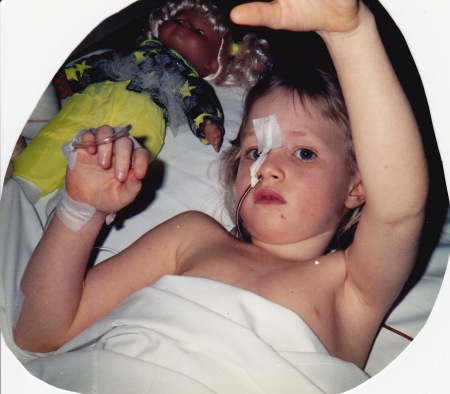
When I was 6, my spleen and gallbladder was removed. I don’t remember much from the surgery, except for the annoying tube in my nose. I had a lot of visits in the hospital from my friends and family and got a lot of attention (and presents), which was nice at that age. My sister had her spleen, gallbladder and appendix removed a year earlier. After the spleen removal, my hemoglobin went from an average of 5 g/dl to 8 g/dl. Both my sister and I didn’t need transfusions anymore. We took antibiotics for about a year and from that moment, we only went to hospital once a year for a checkup with our hematologist.
I lived a very active life: our parents wanted us to do a lot of activities, so our weeks were filled with music classes, singing in the opera choir, horse riding, theater, ballet, jazz dance, … Every day after school, I had another activity to attend. Even though I’m not the most sportive girl, I was perfectly able to live a normal life. Having Pyruvate Kinase Deficiency was something I could easily forget, if it wasn’t for the yellow skin and eyes. Being a teenager, it sometimes was annoying having to answer the same question over and over again: “why are your eyes so yellow?”. But luckily, I wasn’t bullied for it at school nor anywhere else.
After high school, I went to university to become a pharmacist. I had a lot fun, partied a lot and had no difficulties with studying. I graduated with great distinction and started to work as a pharmacist. I am now 29 years old, and with my partner we enjoy travelling, camping, hiking and backpacking. We did some serious treks in the mountains and I did even climb Half Dome (!). My hematologist always warned me for high altitude, so I try to avoid heavy exercise above 3500m (11.500 feet), but I like pushing my limits.

Thanks to the PKD Facebook group, I’ve learned that I’m very lucky to be able to do all these things, because PKD can be much more severe. It also made me realize I cannot deny my disease and I have to take good care of myself. I’m glad to be able to share my story, because I want parents having a child with Pyruvate Kinase Deficiency to know their child may be able to live a normal and happy life.
Disclaimer: This article is written by patients and is meant for basic informational purposes only. It is not intended to serve as medical advice, substitute for a doctor's appointment or to be used for diagnosing or treating a disease. Users of this website are advised to consult with their physician before making any decisions concerning their health. For details see our full disclaimer.
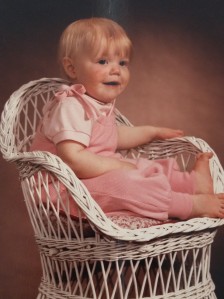
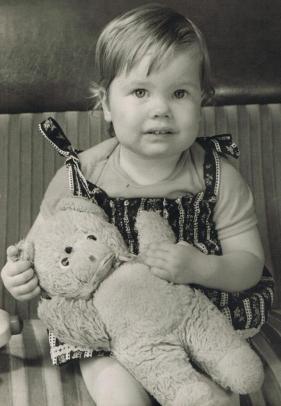
![CAM02283[1]](https://pyruvatekinasedeficiency.com/wp-content/uploads/2015/01/cam022831.jpg?w=400&h=533)
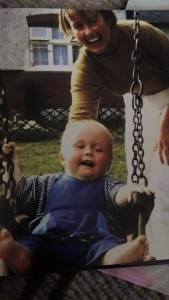
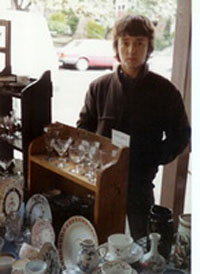
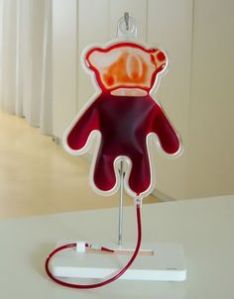
This is just a short example, of my fight.
Hello, I was born with Pyruvate Kinase Hemolytic Anemia. I’ve been fighting for my life for 58 years.
I’ve had my spleen, gall bladder, and appendix removed days before my 18th birthday in 1980. Children’s Hospital told my parents when I was an infant that my gall bladder would act up and I would need it to be removed along with my spleen since it harmed me more than benefitted me.
To have my son, which I was told would kill me, in 1991 I had 24 units of blood in 8 months and a C section because labor would be life-threatening as well as the pregnancy.
Since then I now have Iron Overload, a port in my chest and have to do Desferal IV treatments when my iron spikes over 100, and I do this 3-5 times a week, 12 hours a day, until it goes down to below 50. There is no rhyme or reason why it peaks, I can try to cut most iron out of my diet and it peaks, I eat whatever I want and it peaks. My body is a flipping conundrum and getting older isn’t helping. I go in this Monday, December 21st for a liver biopsy.
I just would just like to connect with others who are ”blessed” with this🥴🥴
LikeLike